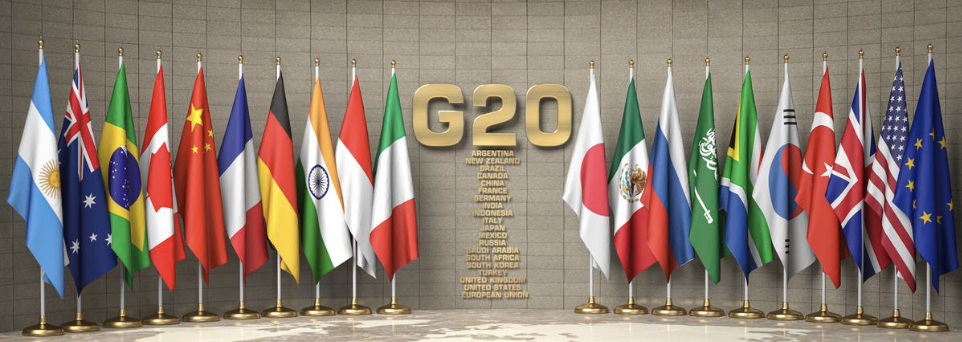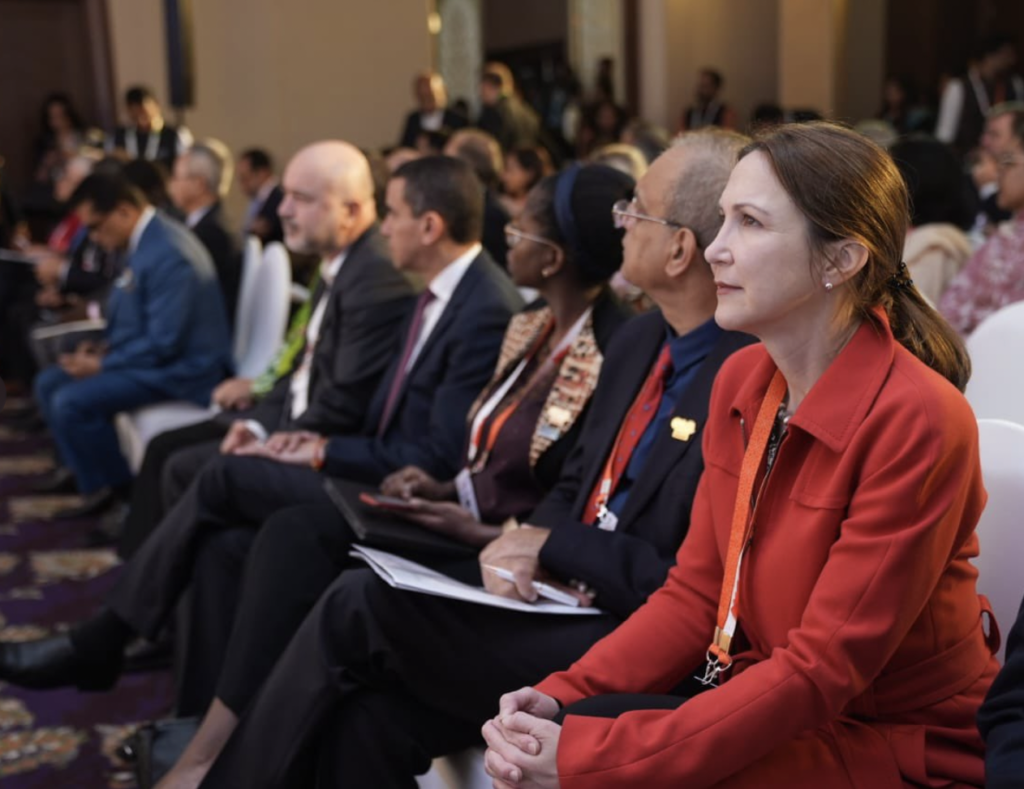2023 marks a historic year as India steps into massive boots at the world stage with its G20 presidency for the first time in its 23-year-old history. The year will be dotted with several international meetings and conferences as India leads the nations in establishing its optimistic vision of ‘healing our One Earth, creating harmony within our One Family and giving hope for our One Future’. As the world grapples with the post COVID-19 recovery, slowing economies and a war brewing in Ukraine, this opportunity for India comes at a critical time to establish itself at the helm of global affairs and stabilize its position as a world leader. Seizing this opportunity, Hon’ble Prime Minister, Shri Narendra Modi put forward India’s agenda for the G20 this year and expressed it as “inclusive, ambitious, action-oriented and decisive”.
Established as an effort to bring together the primary contributors of the global economy to resolve economic and financial crises, The Group of Twenty (G20) comprises 19 countries (Argentina, Australia, Brazil, Canada, China, France, Germany, India, Indonesia, Italy, Japan, Republic of Korea, Mexico, Russia, Saudi Arabia, South Africa, Turkey, United Kingdom and United States) and the European Union.
The G20 members represent around 85% of the global GDP, over 75% of the global trade, and about two-thirds of the world population, and are essentially regarded as the agents of change within the world economy. Gradually, the G20 evolved to establish sustainable and balanced economic growth, promote financial stability for developing and under-developed nations, address key issues including climate change, and establish a platform for the slowly evolving economic powers to contribute to world harmony.

Gradually, the G20 evolved to establish sustainable and balanced economic growth, promote financial stability for developing and under-developed nations, address key issues including climate change, and establish a platform for the slowly evolving economic powers to contribute to world harmony.
With the beginning of its presidency, India has skilfully called for countries to act together to combat the challenges that are no longer limited by borders, and concern the world as a whole. However, the pandemic as well as the Ukraine-Russia war have caused a sharp decline in multilateralism and collective action. With Indonesia’s presidency posing littleopposition to the harsh aftershocks of the pandemic that extended into the economic world, to the tenuous state of peace between NATO and Russia, India’s presidency could not come at a more fortuitous time. However, the responsibility to deal with the repercussions of these events falls upon India’s shoulders as the world looks to it to restore economic stability and carve a plan of action that considers nations with little economic importance.
In November 2022, India assumed the presidency of the G20 in New Delhi and adopted its theme as “India’s G20 Presidency: Prioritizing Human Centricity”. The Indian Government specified that the focus will be on three main pillars that stress upon and highlight the importance of putting people and cooperation at the epicentre of growth and development:
(1) Inclusive Development
(2) Industry 4.0 for All and
(3) Health and Wellness.
The first pillar of ‘Inclusive Development’ highlights the theme of ‘One Earth, One Family, One Future’ best as it prioritizes the creation of an inclusive and sustainable global economy that benefits all citizens and communities. ‘Inclusive Development’ ensures that world leaders take into account, not only the interests of the privileged few, but also the under- developed and struggling countries as well. The Indian government plans to prioritize issues such as digital and financial inclusion, sustainable infrastructure, and innovation-driven entrepreneurship. The main objective is to ensure that the benefits of economic growth are shared equitably and that no one is left behind, especially the vulnerable.
‘Industry 4.0 for All’, colloquially referred to as the fourth industrial revolution, has been established to ensure the integration of technological advancements and economic growth. While the fields of engineering, technology, and artificial intelligence have advanced by leaps and bounds, this growth has often been monopolized and restricted. The ‘for All’ aspect of this pillar ensures that cutting-edge technologies including artificial intelligence, advanced robotics, digital manufacturing, and biotechnology, are used to stabilize economic growth and combat ubiquitous unemployment across developing countries.
The primary objective of Industry 4.0 is to assist countries in creating a future-ready workforce and ensure that the benefits of the Fourth Industrial Revolution are inclusive and reach all sections of society, including small corporate entities, rural communities, and marginalized communities. India’s G20 Presidency aims to establish far more inclusive,sustainable, and equitable growth, where the benefits of economic, social, and technological advancements are shared and used to assist all the members of society. India’s ‘Industry 4.0’ initiative contains the innate potential to bring about remarkable changes in society that will not only increase the standards of livelihood but will also help increase efficiency, productivity, and healthy competitiveness through policies and measures that support digital and technological literacy, innovation-driven entrepreneurship, and the development of a skilled workforce.
Following the lack of a united response to the Covid-19 pandemic, the ‘Heath and Wellness’ pillar is an essential pillar of India’s agenda this year, to ensure an organized, collective approach to combating illnesses around the world. This pillar will focus on addressing health emergencies and pandemics while attempting to garner awareness about issues such as mental health. The objective, per India’s ideals of ‘Vasudhaiva Kutumbakam’, is to ensure that all citizens have access to time-sensitive quality healthcare and to assist healthcare systems in establishing protocols to deal with health emergencies.
The G20 Sherpa Summit at Udaipur, Rajasthan (4th-7th December 2022), set the stage for India’s ascent into its Presidency. With a decisive display of culture, heritage, and optimism, India has successfully projected that its Presidency will bring about a wind of change and will have no difficulty following in the footsteps of its predecessors. India, in its approach, to handling the Covid-19 crisis and its efforts in promoting sustainability, counter-terrorism measures, and strengthening the world economy has already carved a niche for itself on the world stage and the G20 platform will be a well-leveraged opportunity to showcase its strengths and lead other nations in its path for ‘One Earth, One Family, One Future’.


Yuvraj
MemberDeepseek: A journey from Hedge Funds to AI
Introduction: In this busy and bustling day to day life of ours managing our Finances…
Beyond Numbers: The Human Cost of Infosys’ Layoffs and the Global Normalization of Workforce Reduction
A Familiar Script: Infosys and the Corporate Playbook of Disposable Labor: On February 7, 2025,…
Understanding Tariffs and Their Impact on India
What Are Tariffs? Tariffs are taxes governments levy on foreign imports to make the goods more…
The Economics of Player Transfers in Football
Introduction: In the world of football player transfers are more than just transactions, they are…
Session 5
Session 5- Unraveling Equity Derivatives: Insights from the Fifth Development Session The Fifth Development Session…
An Attempt To Deteriorate The Creditworthiness of Indian Entities
Introduction: The growth story of India in almost every sector is not alien to the…








Very well written 🙌
👍🏻👍🏻
Amazing information!
Very well researched and succinct !